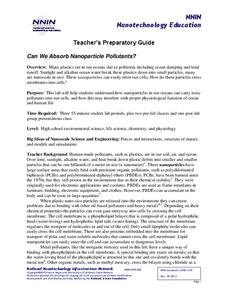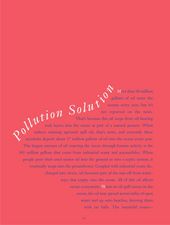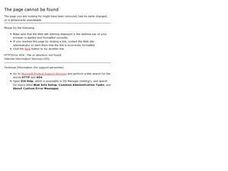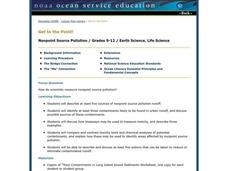National Nanotechnology Infrastructure Network
Can We Absorb Nanoparticle Pollutants?
Just because we can't see it doesn't mean it isn't there! A growing concern for environmental scientists is toxic nanoparticles in our air and water. Young scholars conduct an experiment to demonstrate how these particles can cross our...
National Nanotechnology Infrastructure Network
How Can Nanoparticles Move from Land to Ocean?
Investigate the migration of the nanoparticle from land to water! A lab investigation asks budding scientists to simulate runoff. Testing water samples before and after the simulation leads individuals to make conclusions about pollution...
Alabama Learning Exchange
WATER You Doing to Help?
Auntie Litter is here to educate young scholars about water pollution and environmental stewardship! Although the 15-minute video clip is cheesy, it's an engaging look at the water cycle and conservation. Learners start by illustrating...
Curated OER
Sustainable Livestock
Young scholars investigate healthy eating habits by researching livestock. In this food sustainability instructional activity, students research the negative impact factory farming has on our environment due to pollution. Young scholars...
Curated OER
Understanding Groundwater & the Effects of Pollution
Students complete a unit on the effects of pollution on our water supply. They create a graph to examine the density of earth's land surface, round the population to the nearest hundred million place, participate in a...
Curated OER
What Is a Watershed?
Students explore the concept of water pollution. In this environmental stewardship lesson, students discover what watersheds are and consider how to protect them.
Curated OER
TE Activity: Oil Spill Cleanup
Students experiment by creating an oil spill and trying a number of clean up methods. They determine which methods are the least costly and most effective. They role play as an environmental engineer and as an oil company owner who must...
Curated OER
Protecting Our Planet
Young scholars examine the impact of pollution. For this pollution lesson, students watch Protecting Our Planet, then participate in a simulation of the effect of pollution on a variety of organisms.
Curated OER
How would an oil spill affect a Marine Sanctuary?
Students explore the concept of environmental stewardship. In this science lesson, students discover how scientists assess damages to the environment following oil spills. Students conduct a simulation of a public meeting in order to...
Curated OER
Environmental Education
Second graders examine how their choices affect the environment. They identify different types of pollution and its source. They ask questions to end the lesson.
Curated OER
Pollution Solution
Fourth graders examine how trees help to absorb the pollution that is emitted from automobiles. They review the process of photosynthesis and determine how forest management is important on their reservation. They think about the...
Curated OER
"Hard" Data from Space
Students use satellite images to analyze development patterns within Baltimore City. They prepare a land cover map for Baltimore indicating the prevalence of impervious surfaces and explore how these patterns affect water pollution.
Curated OER
Who Dirtied the Water?
Students develop a greater understanding and concern for the plight of our coastal waterways. Students begin to recognize that we are all partially responsible for water pollution.
Curated OER
Science: Lead Shot and Waterfowl
Students examine data to investigate the impact of lead shot pellets on waterfowl populations. They graph their findings and discover how lead in ingested by birds and poisons them. As an extension, students research legislation and...
Curated OER
Global Change — Change and Cycles Where Land, Air and Water Meet
Young scholars participate in an experiment to define a parts-per-billion solution. For this ecology lesson, students select a second substance to create a parts-per-billion solution and observe and record their results. Young scholars...
Florida Department of Environmental Protection
Build Your Own Aquifer
Ever wondered how an aquifer works? Introduce your class to the amazing way many people get water by exploring how underground aquifers work. Two fun hands-on activities are used to help kids understand what an aquifer is, how it works,...
Curated OER
What's Gotten Into You?
Young scholars use models to investigate the process and consequences of water contamination on the land, groundwater, and plants.
Curated OER
Get to the Point!
High schoolers write out sources of pollution and identify contaminants are most likely found in urban runoff. In this pollution lesson students compare toxicity tests and chemical analysis of potential contaminants.
Curated OER
Our Environment
Students examine the world's environmental dilemmas and create project depicting how to improve the environment. They study ten endangered species.
Curated OER
Environmental Jobs
Students evaluate whether particular jobs have a positive or negative impact on the environment. In this career exploration lesson, students complete a worksheet in pairs to determine if and why various jobs impact the environment.
Curated OER
Nutrition: It's In Your Hands
Fourth graders use this lesson to focus on their health, nutrition and the state of the environment. In groups, they examine the various types of land, water and air pollutants and compare and contrast a food chain with and without a...
Curated OER
Stream Ecology In Wisconsin and Puerto Rico
Students identify the different types of water and explain in what proportions they exist on Earth. They identify and correctly label the parts of the water cycle and how these parts interact with each other. Students identify the...
Curated OER
Human Impact on Water Quality
Learners identify at least three common repercussions of developing water front property on water quality. They describe three sources of water pollution. They research the organism striped bass and observe it if striped bass is available.
Curated OER
The Breathtaking Nature of the Urban Explosion, Part 2
Young scholars explore ozone levels. They measure the concentrations of ground-level ozone in the atmosphere. Students observe changes in the concentrations of ozone over time. Young scholars complete a data sheet to record ozone...


